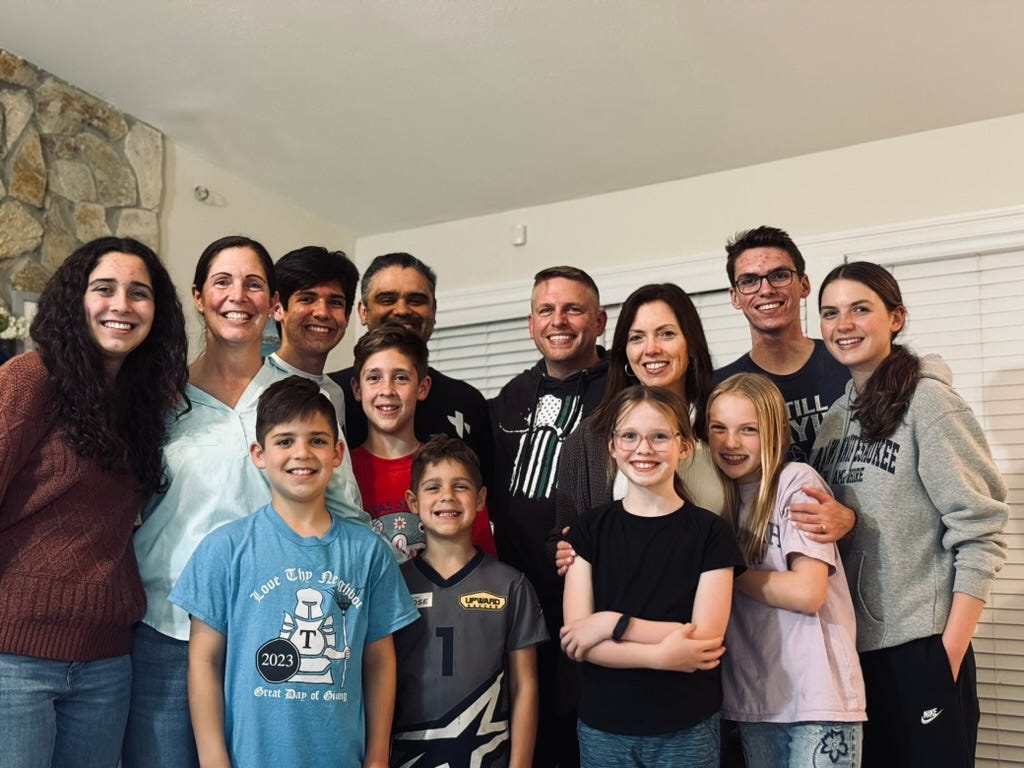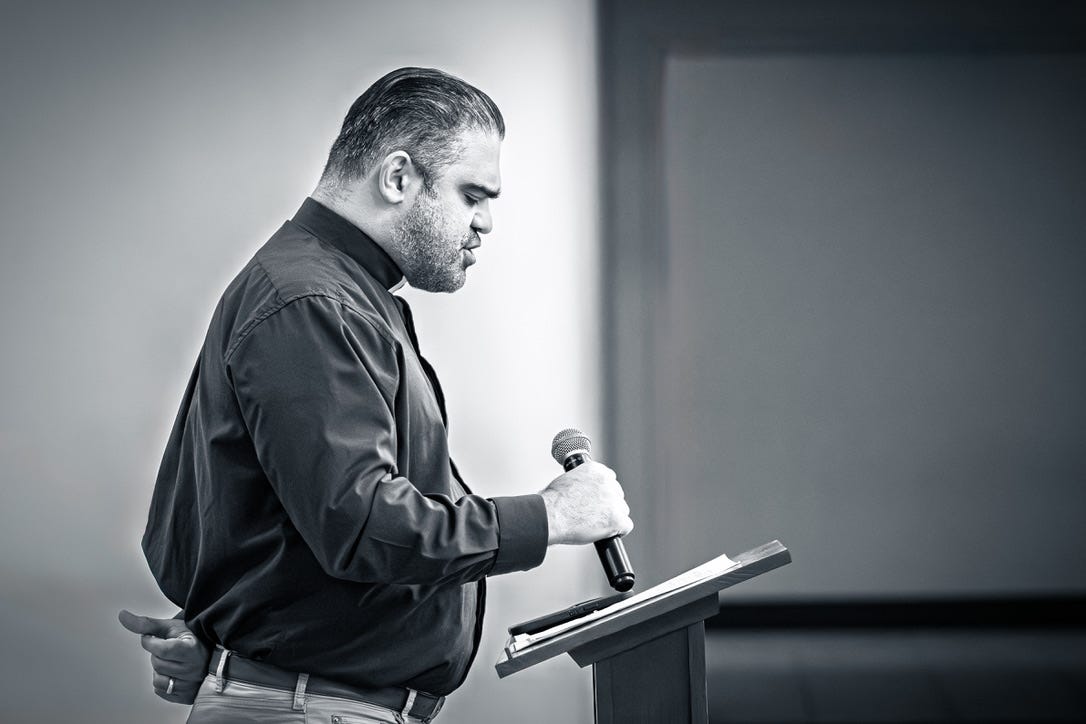On the Virtue of Peace, Part 3: The Consequence of a War Well-Fought; Joe Rigney on Empathy & Traveling Updates
Peace is not the absence of war but the consequences of a well-fought war.
The Father is love (I John 4:8), who sent the Son to die for the joy set before him (Hebrews 12:2); he endured the cross, scorning the shame, and sat down at the right hand of the throne of God. When he ascended, the Spirit of peace descended.
The nine fruits of the Spirit are not randomly thrown together. They form three triads. In this essay, we come to the third virtue of the fruit of the Spirit, and it forms the first triad, which we will call the “Trinitarian triad.” In summary, this triad goes like this:
The Father is love (I John 4:8), who sent the Son to die for the joy set before him (Hebrews 12:2); he endured the cross, scorning the shame, and sat down at the right hand of the throne of God. When he ascended, the Spirit of peace descended.
These virtues are found in all the Persons of the Godhead, but it is compelling to note that the first three fruits are primary attributes of each Person.
When does peace come in the Gospels? It doesn’t come necessarily in the ministry of Jesus. No, Jesus is constantly at war with the religious and political leaders. There is always some attempt at imprisoning or killing our Lord. He is moving from town to town, facing the Devil and his hitmen. The life and ministry of Jesus is the farthest thing from peace. It’s adventurous, but we rarely see Jesus resting in the Gospels. If you read Mark’s Gospel, it reads like a warrior’s journey.
So, when does peace come? It comes when Jesus' ministry on earth finishes. He tells the disciples that they will not have peace until he goes to heaven, and then he will send the Spirit of peace to comfort them.
Peace Defined
And this leads me to my definition of peace.
Peace is not the absence of war but the consequences of a well-fought war. And I define war as the constant engagement of earthly duties.
Peace is rest from our earthly duties. The man who does not labor can’t find peace. Children who don’t develop good work ethic will grow to be peaceless. Peace is the sabbath sleep of warriors. Paul says the fruit of the Spirit is peace. It’s the fruit, which is to say, it’s the result of something. Like love and joy, you must fight for peace in a life filled with conflict and compromises.
The fruit of the Spirit is peace, not just a piece of peace, but the whole pie of peace. For Paul, your entire body needs to be at peace. You may be bruised after a conflict; your feelings may be hurt; you may feel sad, but there is nothing like the sleep of peace in life and death at the end of our earthly duties.
Peace in Galatians
Paul’s case for peace is set in the context of his war-letter to the Galatians. Paul’s letter is a diatribe against a church so easily seduced by false teaching. It ends with a clear outline of how they will find comfort again. The Fruit of the Spirit is the solution to the Galatian heresies.
The word peace in Galatians speaks to harmony with one another. “The Greeks attained this serenity by withdrawal from the world’s concerns.”[1] But Paul considers peace a pursuit while living within worldly concerns. He is not looking for an easy escape route. He urges the Galatians to fight for peace.
Again, peace is not removal but resilience in the work God has for us. For Paul, paradoxically, you find peace by confronting and challenging those ideas and purposes that would ruin the church's health. And Galatia has seen plenty of that! That is why Paul’s words are hard for a church that is falling for the traps of evil men.
The Spirit of Peace
We would do well to remember that the Holy Spirit is the One who produces peace within so that we would be agents of reconciliation. We are most like the Spirit when peace is externalized. Peace is shalom. Again, it’s not the absence of war but the consequences of a well-fought war. These virtues don’t appear at your doorstep like an Amazon package 24 hours after your order. In fact, the longer you passively wait for these virtues, the farther you will be from them. Peace is something you want and must do for honor and glory.
In my estimation, it’s one of the least desirable fruits because it requires the most from us. And yet, it’s a fruit, a byproduct of our Christian walk. Many people want peace without conquest, comfort without relationships, food without work, trophies without sweat, and success without God’s laws. You can’t have it, and the Spirit won’t give it unless you ask and desire it with all your heart, mind, soul, and strength!
Now, remember that Paul did not invent peace. Peace is a great concept in the Old Testament. It’s shalom in Hebrew, which means wholeness. Peace is at the heart of Jesus’s desire for his kingdom. Remember in the Sermon on the Mount when our Lord says:
“Blessed are the peacemakers, for they shall be called sons of God.”
In the first century, the Romans were known to have brought peace among the nations through the use of the sword; the Romans possessed a powerful army; and the Roman emperors were known as the great pacifiers, bringers of peace. It is in this context that Jesus brings this radical message of peace. His message was a response to the current models of the kingdoms of this world then and now. This should not have shocked the early disciples or us because the prophet Isaiah prophesied that the child would be called the Prince of Peace.
St. Luke tells us that Christ came “to give light to those who sit in darkness and in the shadow of death, to guide our feet into the way of peace.”[2] Jesus desires his kingdom people to embrace his peace agenda, which means they must embrace their earthly duties in the kingdom.
Peace is Corporate
When we approach Paul’s fruits of the Spirit, one of the great concerns is to read them in isolation, to view them as an application to me rather than an application to how the community ought to operate. And Jesus and the Apostle Paul are always in harmony. The application is fundamentally corporate in the Sermon on the Mount and in Paul’s Letter to the Galatians. The individual can’t simply take this fruit and tuck it away in the closet; the individual must see the call to peacemaking in the community, kitchens, living rooms, and church gatherings. Sometimes, we think that if we stay away from conflict, we can sleep at night knowing that I am a person of peace. But don’t confuse peace with cowardice.
Peace Ditches
We can fall into two ditches when considering peace in the context of relationships. The first is to avoid all conflict and to separate yourself. You may say: “Well, I just don’t like conflict.” It’s understandable when you desire to avoid getting messy. I completely understand that you want your tombstone to say: “Here lies ___________: he never liked conflict.” If, somehow, in your years as a Christian, you have concluded that peace is avoiding conflict, let me kindly tell you, “You have never been so wrong in your life!” To be a peacemaker is not trying to indulge people by buying their favor. “As long as I always play nice, no one will hate me.” No. Pursuing peace necessarily entails conflict at some level. This is extremely clear in Paul’s letter to the Galatians. If Paul chose a non-conflict resolution, he might as well add an addendum to that church: “Hell awaits you.” Thank God Paul did not mince words as a pastor!
But there is another ditch. We don’t become peacemakers by forcing our way into peace. Sometimes, we manipulate people into peace. Some live as if conflict is a way of breathing. They have sought conflict so much that everyone around them is tired and overwhelmed by their indictments and hawkish attitudes. They lack flexibility. They don’t know how to accommodate their words or actions with people. “I am the only one fighting for truth. If I don’t fight for truth, no one else will.” You don’t have to dig too far into their social media history or their personal histories to see that they have left a trail of blood and bad relationships behind them. I urge you to avoid this ditch with as equal fervor as you avoid the first.
We need to guard our hearts from complacency and unnecessary conflict and think through and strategize how God wants us to deal with conflict. That takes wisdom and a faithful community around you!
The Practicality of Peace
Let me conclude with a few applications for how we can bear the fruit of peace in the right, biblical way.
First, the Psalmist also delves into this theme of peace in a very practical way when he says in Psalm 34: “Keep your tongue from evil and your lips from speaking deceit. Turn away from evil and do good; seek peace and pursue it.”[3] Those who do not seek peace are those whose lips speak deceit.[4] Stay away from lies and evil conversations. Instead, your posture as a kingdom people is to pound at the door of peace. Do not wait for others to seek peace; you are honored and exalted when you seek peace first; when you are faithful to your earthly duties. Sometimes, there is a price to pay for seeking peace. As C.S. Lewis once stated:
“There are times when something needs to be done and yet we know that if we step up and do this needful thing, we will pay a heavy personal price.”[5]
Pursuing peace is demanding. You must get your hands dirty to clean up the situation.
I want to end by discussing how we can manage or steward conflict. I want to use the word stewardship very carefully.[6] When Jesus talks about managing something, he refers to the proper responsibilities that come with an investment. A steward does not manage things for his own pleasure but for the pleasure of his master. This is the best way to think of conflict. A conflict is not God’s curse on you; it’s, in the words of one writer, “a management opportunity.”[7] It is quite fascinating how these virtues build on one another. Without going into too much detail, we can say that love and joy prepare us to manage conflict well. People who are selfish and prideful will view conflict as a way of getting what they want. They will not steward conflict with godliness. In short, stewarding conflict will require love and joy. So, in the middle of conflict, we need to realize that these principles must be at work. And this works well with our children: we remind them and ourselves that the goal of conflict is wholeness and peace. “My sister took my toy.” “He hit me.” You don’t have to go overboard in the explanation, but you need to give them at least something to grab a hold of it in the middle of conflict. “Children, God desires peace. What can you do to seek peace with your sister?” “Well, I can give the toy back.” Yes, that’s one option. But that’s a conflict band-aid. Managing conflict requires words. Let’s try again: “I am sorry I took your toys. Please forgive me.” “I forgive you.” That can take ten seconds or less.
Sometimes, parents prefer the distance conflict management model because we assume it will require too much time. You think, “Well, on a typical Saturday, my kids will go through 75 conflicts, which adds up to about two hours of my day.” It’s true: if you feel it is your task to treat every conflict and impose peace on your children. But if you begin with little principles early on, they take it upon themselves to pursue peace. It’s a simple principle, but children who are told to make peace will not seek peace when they are no longer told.
For adults, it is similar: we need the habits and principles of peace to pursue peace. Peace is the consequence of a well-fought war. It’s embracing your earthly duties faithfully. When you lie to sleep at night, do you sleep at peace?
I remember receiving a call from a young lady who was angry at someone some years ago. “She passed right by me and didn’t say a word to me. I can’t believe she would treat me this way.” “Well, what did she say when you asked her about that?” “Pastor, of course, I am not going to ask her…I am angry!” “I asked: would you send her a text and ask?” So, she sent me a draft of a text full of accusations…all unfounded, of course. I helped her draft a better text to send. So, after a while, she had a text ready to go, and right before she hit send, she got a text from that friend. And her friend said something like, “I am so sorry I left without saying bye yesterday. I had a terrible headache and needed to go home to rest.” With one text, that young lady learned an important lesson: you can’t steward your conflict well if you have already formed an opinion about the conflict.
Being a person of peace is not easy. It actually requires a lot of work. Our human natures are always more prone to conflict and disunity, which means that the fruit of the Spirit demands a fervent pursuit of peace. If you pursue your earthly duties faithfully, you will find peace after a war well-fought.
May the God of all peace be with you.
[1] Review and Expositor, Henry H. Mitchell
[2] Luke 1:79.
[3] Verses 13 & 14.
[4] A strong theme in James.
[5] Twitter quote of Lewis.
[6] This entire concept comes from The PeaceMaker Ken Sande.
[7] chrome-extension://oemmndcbldboiebfnladdacbdfmadadm/https://rw360.org/wp-content/uploads/2013/02/Peacemaker_3rdEd_Ch1.pdf
Nuntium
It was wonderful to have my friend Joe Rigney here in Pensacola with us for the weekend. We kept Dr. Rigney quite busy for the Lenten Lectures, Sunday School, and sermon.
Here is his lecture on empathy and feminism:
It was also a delight to have some dear friends visiting us. Lars was one of my deacons 10 years ago, and for the first time since 2015, he brought his entire family to visit. We shared great memories through dinner and beyond.
I am leaving early tomorrow until Thursday to spend a few days with the good folks at Turning Point Pastor Summit. Charlie Kirk and his right-hand man, Lucas Miles, invited me to attend a few lectures and meetings with pastors around the country. I am unsure what to expect, but I hope it bears good fruit.
I ask you to pray for me, as my trip tomorrow will inaugurate a season of heavy traveling that will last until late July. I have around 25 engagements this year around the country and the world, and I am eager to use the platform God has given me to bless the saints.
As I have said before, this will be the busiest year of my professional life. Pray for stamina, safety, and wisdom in this long season.
Lenten Blessings,
Uriesou Brito









So so great to be back with our Providence community and spend time with you and the fam!!!